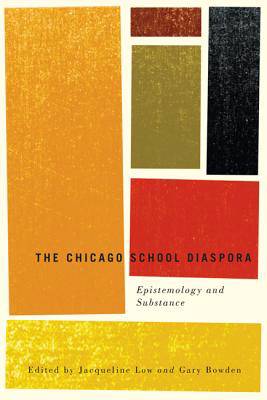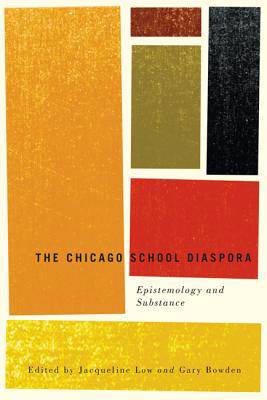
- Retrait gratuit dans votre magasin Club
- 7.000.000 titres dans notre catalogue
- Payer en toute sécurité
- Toujours un magasin près de chez vous
- Retrait gratuit dans votre magasin Club
- 7.000.0000 titres dans notre catalogue
- Payer en toute sécurité
- Toujours un magasin près de chez vous
The Chicago School Diaspora
Epistemology and Substance
Jacqueline Low, Gary Bowden
Livre relié | Anglais
177,45 €
+ 354 points
Format
Description
When the University of Chicago was founded in 1892 it established the first sociology department in the United States. The department grew rapidly in reputation and influence and by the 1920s graduates of its program were heading newly formed sociology programs across the country and determining the direction of the discipline and its future research. Their way of thinking about social relations revolutionized the social sciences by emphasizing an empirical approach to research, instead of the more philosophical armchair perspective that previously prevailed in American sociology. The Chicago School Diaspora presents work by Canadian and international scholars who identify with what they understand as the Chicago School tradition. Broadly speaking, many of the scholars affiliated with sociology at Chicago understood human behaviour to be determined by social structures and environmental factors, rather than personal and biological characteristics. Contributors highlight key thinkers and epistemological issues associated with the Chicago School, as well as contemporary empirical research. Offering innovative theoretical explanations for the diversity and breadth of its scholarly traditions, The Chicago School Diaspora offers a fresh approach to ideas, topics, and approaches associated with the origins of North American sociology. Contributors include Michael Adorjan (University of Hong Kong, China), Gary Bowden (University of New Brunswick), Jeffrey Brown (University of New Brunswick), Tony Christensen (Wilfrid Laurier University), Luis Cisneros (postdoctoral scholar, University of Arizona), Gary A. Cook (Beloit College), Mary Jo Deegan (University of Nebraska-Lincoln), Scott Grills (Brandon University), Mervyn Horgan (University of Guelph), Mark Hutter (Rowan University), Benjamin Kelly (Nipissing University), Rolf Lindner (Humboldt University & HafenCity University, Germany), Jacqueline Low (University of New Brunswick), Mourad Mjahed (Peace Corps, Rabat, Morocco), DeMond S. Miller (Rowan University), Edward Nell (New School for Social Research), David A. Nock (Lakehead University), Defne Över (PhD candidate, Cornell University), George Park (Memorial University), Thomas K. Park (University of Arizona), Dorothy Pawluch (McMaster University), Robert Prus (University of Waterloo), Antony J. Puddephatt (Lakehead University), Isher-Paul Sahni (Concordia University), Roger A. Salerno (Pace University), William Shaffir (McMaster University), Greg Smith (University of Salford, UK), Robert A. Stebbins (University of Calgary), Izabela Wagner (Warsaw University, Poland and CEMS EHESS - School for Advanced Studies in Social Sciences, France), and Yves Winkin (ENS Lyon, France).
Spécifications
Parties prenantes
- Auteur(s) :
- Editeur:
Contenu
- Nombre de pages :
- 408
- Langue:
- Anglais
Caractéristiques
- EAN:
- 9780773542655
- Date de parution :
- 05-12-13
- Format:
- Livre relié
- Format numérique:
- Genaaid
- Dimensions :
- 152 mm x 231 mm
- Poids :
- 680 g

Les avis
Nous publions uniquement les avis qui respectent les conditions requises. Consultez nos conditions pour les avis.






